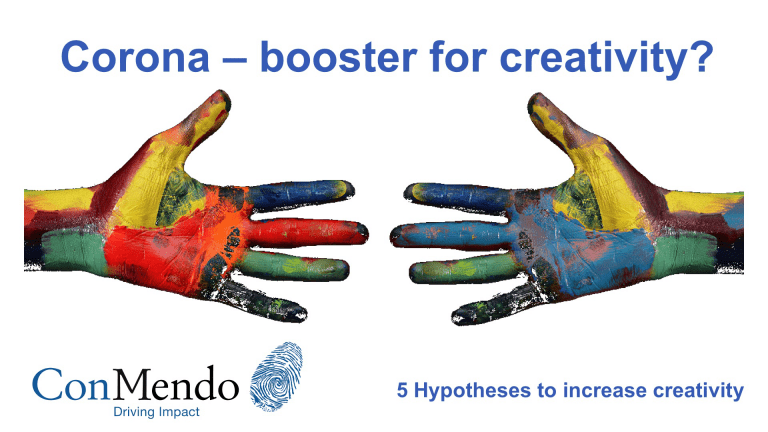The world is currently experiencing change to a yet unknown magnitude. The Corona Crisis relentlessly exposes vulnerabilities of established processes and structures; but it also drives change in an unprecedented scale and with breath-taking speed. In times where certain markets are not accessible, value chains are instable, and liquidity becomes scare it is crucial to enable and boost skills which allow companies to reinvent themselves and start from scratch. They enable the generation of creative and innovative ideas to allow the continuation or the reorientation of the company, particularly during a crisis.
The examples and evidence are not exhaustive, but merely serve to illustrate the immense potential for creativity that we have observed during the last months.
Challenges on all levels
The effects of the Corona crisis are omnipresent: they cause some industries to collapse and some industries to excel. Activities and functions have to – where possible – get adapted to the new needs in the short term. The same applies to supply chains, especially international ones, which have been literally cut off by border closures. Established partnerships are being tested. Due to the lock-down, employees are either no longer able to perform their duties or are confronted with a variety of new tasks which not normally part of their tasks. In all cases, management also faces new requirements. “Leading from a distance” requires other skills (hard and soft), and possibly a more intense –mostly virtual– contact between management and employees. Liquidity is now important for all divisions of the company, and everyone is asked to add contribution. Hardly any company has built up enough liquidity buffers to ensure security for much more than three months. So how to deal with challenges at all levels?
Hypothesis 1: Corona opens new paths!
We speak of creativity when new ideas or solutions are developed, or existing solutions are applied in new ways. Creativity is therefore, at its core, a creative ability.
Creation always means breaking with the familiar and taking new paths. Within four to six weeks, a complete Corona ecosystem has self – developed in Germany:
- Textile: T-shirts turn into face masks
- Chemistry/Beauty: Colours become disinfectants
- Transport: Taxis do not transport people, but goods
- Hotel industry: Hotel rooms become flexible – and safe – coworking spaces
- Exhibition building: Plexiglas protection devices for industry and get changed to be used for shops
The above mentioned actions, coupled with a smart marketing campaigns of the respective companies can create a positive image that shows the world “We are there when you need us”, which will continue well beyond the time after the Corona crisis.
The examples mentioned are about much more than “needs must”. It shows a fundamental openness to new challenges, like previously unknown needs on the market and their constructive response.
Hypothesis 2: Corona mobilizes all divisions!
Creativity and innovation are often solely related to the development of new products (product innovations) and services. The Research and Development Division (R&D) therefore often play the role of the creative centre.
Especially in times of crisis, however, it becomes clear that good end products for the customer alone do not guarantee economic success. Existing products (solutions) and services need to be further thought through and creatively designed. Creativity therefore must go further than R&D, but must find its way into all functional areas. The entire value chain thus becomes the subject of creative considerations.
A look behind the scenes, e.g. from HR, shows the ingenuity of the personnel:
- Recruiting and onboarding: Despite or especially because of the crisis, it is important to secure critical resources. Virtual processes enable “global recruitment”.
- Remuneration: Established remuneration models are being put to the test. New salary components and targets are developed, negotiated, and implemented.
- Personnel development: The Corona crisis becomes an (informal) executive assessment.
- Organizational development: HR collects virtual mood images and trains managers
- Working methods: Home office solutions or flexible working become the norm.
Creativity must not be an attribute reserved for a few areas. Creativity is an overall entrepreneurial characteristic. Business Acumen is more important than ever, and every division of the company has to create solutions for the further development of the company to secure its livelihood.
Hypothesis 3: Corona promotes collaboration – even between different companies!
Uncertainty is characterized by the lack of established and functioning solutions or routines.
Complex questions, such as how to overcome the Corona crisis, cannot be answered in internal silos.
Internal cooperation:
- Cross-functional crisis units; only the diversity of perspectives enables a comprehensive understanding of problems and solutions.
- Cross-functional problem-solving communities develop integrated, holistic solutions and promote mutual understanding.
Partnerships outside the company are currently being revalued in many places:
- The crisis shows who is reliable and defines with which (new and old) partners companies should (continue) to cooperate now and after the Corona crisis.
- Employees get permission to provide temporary support in other companies.
- Stocks get shared between companies.
Mutual understanding is the basis for partnership. Companies can only succeed the crisis by forming the right partnerships – both financial and personal – at the right place at the right time.
Hypothesis 4: Corona accelerates implementation!
Additional to the generation of new ideas or solutions, the way these get implementation – for example in time or with a short time-to-market – is an essential part of creativity. Creativity can be understood as a product of solution and implementation for novel problems. Especially the topics governance and organisational principles force companies – in times of crises – to speed up implementation:
- Fast and direct internal communication to obtain relevant information
- Shorter decision cycles, e.g. daily instead of weekly virtual sessions
- Decentralized decisions on the ground instead of universally valid central decisions
- Situational adjustment to comply with internal guidelines and requirements
- More flexible working hours, locations and pay models
Centralization and decentralization are no longer a contradiction in times of Corona but need to be used and applied in the organizational structure at the same time and in parallel. It is all about finding the right balance. It remains to be seen to what extent Corona will initiate companies to rethink corporate security, data protection, compliance, and industry relevant regulations.
Hypothesis 5: Corona shows that creativity is no coincidence!
Creative problem solving is often associated with intuitive, chaotic processes or spontaneous promptings. However, this is only partially correct. Creativity is, by no means a purely intuitive phenomenon or random product and is usually associated with hard (mental) work.
- Creativity has been vital for people since the beginning of human history, especially in extreme situations.
- Each person unconsciously has a certain perspective (“fixation”) to a given problem. These fixations can be removed by “impulses from outside”.
- Approaching a problem with creative techniques (heuristics) requires two essential characteristics:
o Heuristics cannot guarantee the success of a solution, it only increases the probability of solving the problem.
o Heuristics are based on creative approaches such as combination and decomposition, which are techniques that are increasingly used in times of crisis due to the lack previously tested solutions.
Therefore, a crisis can offer opportunities if these creative methods are deliberately used to help “luck” to find better solutions.
What remains after the crisis?
The key question we have to ask ourselves is to what extent can we identify success factors and obstacles from the way we managed the crisis and use the positive impact on the ability to self-renew in the future. This has to become a fixed topic on the agenda for all companies in the post-Corona period. Management can influence and control of such self-renewal forces through the appropriate design of goals, plans, organization and resources. All in all, we have to remain hopeful that we will remember everything we have learned and changed during the crisis in the future in order to be well prepared for the next crisis.
Please contact us and benefit from our vast experience.
Photo by Neil Thomas on Unsplash



